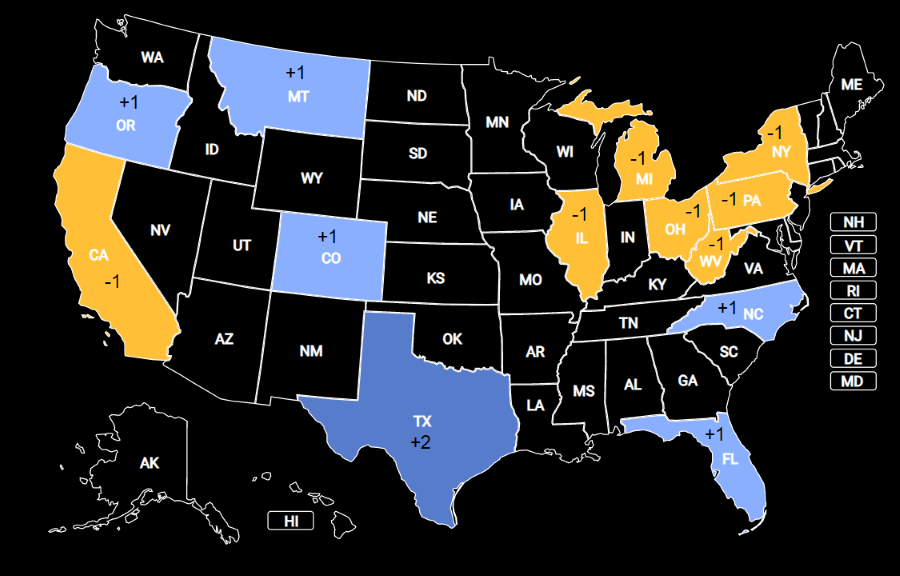The Census Bureau recently released the numbers gathered from the 2020 census. Only seven House seats require reallocation from state to state, much smaller than the 12 seats that changed hands after 2010. The United States House of Representatives is set at 435 members; the census’s job is to allocate those seats. Every ten years after the government counts how many people reside in each state, the Census Bureau adds and subtracts House seats from states.
NC Among The Winners
North Carolina gained a House seat, bringing the total number of seats up to fourteen. The last time North Carolina gained a seat was after the 2000 census.
NC has grown a whopping 9.5 percent since the 2010 census, with the state being a popular spot for those looking for a milder climate and a cheaper housing market. This means that when the General Assembly takes up the issue of redrawing the state’s Congressional map, they’ll have to make room for an extra seat. This is good and bad for the North Carolina Republican Party, which currently controls the General Assembly.
They will most likely be able to draw the additional seat to be a safe Republican seat, adding another Republican to the already closely divided House. However, when adding another seat, they’ll have to be careful not to draw out any incumbents. In a perfect world for the NCGOP, they’d be able to protect all of the sitting Republican House members, draw the new seat to lean red, and gerrymander out one or two of the five sitting Democratic Representatives. Meeting all of these criteria would likely create an ugly map that would quickly get struck down in the courts.
The Other Growing States
Among the other states gaining Congressional seats are Oregon, Colorado, Florida, Montana, and Texas. For Montana, the state will be going from one at-large seat to two districts. Texas has continued to see exponential growth; the state gained a record four seats after the 2010 census and is set to gain another two after this, bringing the seat total up to 38. Among states who didn’t gain seats, but grew a great deal are Nevada, North Dakota, Idaho, and Utah which all grew over 15 percent.
Another lucky winner is Rhode Island, while the state’s two congressional districts will not add or subtract seats, everyone thought they would. In most every population estimate, Rhode Island was set to lose its second seat, bringing the state down to a single at-large seat. However, to the surprise of many, the state had retained enough population to sustain two seats.
The Losing States
Seven states will be losing a single seat in Congress after redistribution, most of which reside in the midwest to the northeastern part of the country. They include New York, Pennsylvania, West Virginia, Ohio, Michigan, Illinois, and the lone western state California. The loss of seats for New York especially stings. After losing two seats post the 2010 census, most population estimates predicted that New York would lose another two seats in this one. Yet, after the Census Bureau released the 2020 numbers, it came out that the state was 89 people short of keeping all 27 of its districts. If New York had counted 89 more people, it would have been Minnesota who lost a district.
Several states missed out on gaining seats as well. Most all population estimates predicted that Arizona would gain an additional district, Florida would gain two districts instead of one, and Texas would gain three districts instead of two. All three came up short, and most came over a hundred thousand people short of the estimates. Most accredit the inaccuracy to a gross undercount of undocumented immigrants and members of the state’s Latino population.
The Partisan Impact
If these seats had been in place under the 2020 presidential election, the Electoral College votes would have been slightly skewed. The results would have gone from 306-232 to 303-235. While not a huge change in reference to the 2020 election, the Electoral College vote change could be big on influencing future close Presidential elections.
It’s entirely too early to predict how the reapportionment will affect the partisanship of the House of Representatives. However, take note that in Texas, Florida, and North Carolina, which account for four of the new seats, Republicans control the redistricting process. In New York and Illinois where Democrats control redistricting, it is likely that the state legislatures in those states will opt to draw out a Republican representative to account for the seat loss. Whichever party benefits from reapportionment and redistricting, one thing is for sure — it’s going to be messy.

Hi! My name is Jacob Smith and I am a staff writer for The Mycenaean. I am also a political activist and volunteer.

Leave a Reply